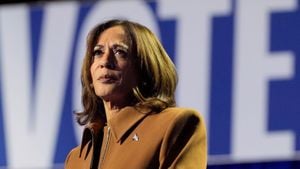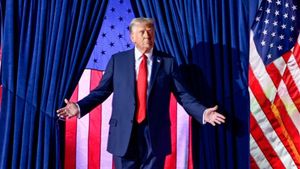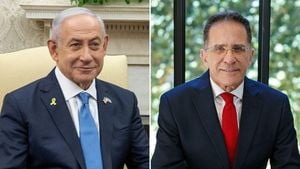Tulsi Gabbard’s recent nomination as President-elect Donald Trump’s Director of National Intelligence has stirred significant debate and concern across the political spectrum. Gabbard is no stranger to controversy; once celebrated as a rising star within the Democratic Party, her political evolution, especially during Trump’s era, reflects broader schisms within American politics.
Initially rising to prominence alongside progressive figures like Senator Bernie Sanders, Gabbard served four terms representing Hawaii’s 2nd congressional district. A decorated military veteran, she earned recognition for her critique of U.S. foreign intervention, especially during her 2020 presidential campaign. It was during this time she adamantly opposed American military engagement abroad, advocating for policies aimed at promoting peace rather than perpetual conflicts. This anti-interventionist stance made her appealing to some voters but alienated her from party loyalists who sought more interventionist approaches, particularly concerning issues like Russia’s aggression and global stability.
Gabbard’s shift away from the Democratic Party began to take shape around 2022, culminating with her official endorsement of Donald Trump this past August. At her endorsement event, she commended Trump for his willingness to engage with foreign leaders and criticized the Biden administration for what she described as reckless military policies. "I see war as something to be avoided — not sought after. We should follow the path of peace, not the path of escalation," she declared at the time, echoing themes central to her previous political platform.
Following her decision to leave the Democratic Party, Gabbard faced renewed scrutiny over her past comments and actions, particularly her controversial past positions on LGBTQ+ rights and foreign policy stances. While she had apologized for previously supporting anti-LGBTQ+ policies and claimed to have evolved, her recent public defenses of figures like Syrian President Bashar al-Assad have continued to draw criticism. Her nomination to lead all U.S. intelligence agencies adds another layer of complexity to her already complicated legacy.
Trump expressed confidence about her capabilities as Director of National Intelligence, stating, "I know Tulsi will bring the fearless spirit of her illustrious career to our Intelligence Community, championing our Constitutional Rights, and securing Peace through Strength." Her expected roles would include overseeing the National Intelligence Program and serving as key advisor to the President on matters of national security — access to information from all 18 intelligence agencies would be part of her new responsibilities.
Yet skepticism runs rampant, especially among Gabbard’s former Democratic colleagues. Concerns have been raised not only about her qualifications for the role but also about her track record of comments perceived as sympathetic to Russian interests. Her prior assertions during the Russia-Ukraine conflict, particularly her claims of U.S.-funded biolabs in Ukraine and her suggestions about Ukraine's neutral status, have fueled arguments against her fitness for such high office. Critics within her party and the broader American political establishment view these statements as aligning with Russian propaganda, damaging to U.S. interests.
Indeed, her history of characterizing Assad as not being the enemy of the U.S. continues to haunt her candidacy. Gabbard’s visit with Assad during the Syrian civil war sparked outrage and highlights her standing as consistently at odds with both typical Democratic and Republican foreign policy norms. Trump's other recent controversial appointments, such as Representative Matt Gaetz for Attorney General, only exacerbate existing tensions, framing them as deliberate moves likely to provoke confirmation battles.
Gabbard’s position and the implications of her leadership will undoubtedly undergo thorough scrutiny by Congress, particularly as she asserts herself on nuanced topics such as military intervention, civil liberties, and international diplomacy. She will need to navigate complex geopolitical landscapes, including U.S. positions on Ukraine, Russia, and volatile Middle Eastern affairs.
Questions linger over how Gabbard's views might shape the U.S. stance on key global issues, especially considering the heightened tensions surrounding Ukraine and the ever-evolving dynamics of U.S.-Russia relations. The juxtaposition of her anti-interventionist rhetoric against the traditional military strategies of the Pentagon might pose significant internal challenges within the Intelligence Community.
The director of national intelligence oversees vast financial resources, with the annual budget of the National Intelligence Program totaling over $70 billion. The DNI also coordinates efforts among 18 agencies, including the CIA and FBI, requiring diplomatic skills and depth of experience — areas where critics argue Gabbard has gaps.
Some Democratic lawmakers have labeled her selection as reckless, questioning whether her repeated expressions of admiration for authoritarian figures signal irresponsibility. Former CIA officer and current U.S. Representative Abigail Spanberger expressed her astonishment, labeling Gabbard "ill-prepared and unqualified," reflecting the disbelief echoed across much of the Democratic party. Meanwhile, Trump's announcement of Gabbard's nomination came alongside other eyebrow-raising picks, signaling his commitment to unconventional and contentious leadership choices, reminiscent of his first term.
Even amid the growing skepticism, Gabbard maintains her supporters within certain factions of the Republican Party, emphasizing the portion of the electorate appealing to her outspoken approach on foreign policy. Her vision aligns with those desiring significant shifts from conventional military engagements, advocating for dialogue over more aggressive strategies.
Gabbard’s nomination marks yet another chapter in her unpredictable political career, illustrating the extent of her transformation from progressive darling to contentious GOP figurehead. The ramifications of her potential confirmation will serve not only as reflections of individual sentiments but as expressions of shifting alliances and ideology — extending beyond her personal narrative to encompass broader national discourse and direction.
Supporters and detractors alike will watch closely as her Senate confirmation hearings approach, likely amplifying discussions about her past, present, and future as one of America’s most polarizing political figures. The debate encapsulates intrinsic questions about American identity, foreign policy, and the principles guiding U.S. governance at home and abroad. Gabbard stands at the precipice of either solidifying her legacy or stepping reload as all eyes turn to the impending approval process for this significant appointment.



